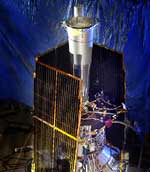
Image credit: NASA
NASA has decided to push back the launch of its mission to test Einstein’s theory of general relativity, Gravity Probe B, until December 6. During recent tests, engineers noticed electronic noise coming from the sensor attached to one of the spacecraft’s gyros, so they’ve extended the launch date to find time to fix it. Once it does launch, Gravity Probe B will detect any distortions on its four spinning gyroscopes to detect the Earth’s distortion of spacetime around it – as predicted by Einstein.
After a review of test data, a decision has been made to reschedule the launch of Gravity Probe B (GP-B). The launch had been scheduled for Dec. 6 from Vandenberg Air Force Base in California.
Data obtained during spacecraft prelaunch testing shows electronic noise on an output channel associated with the No. 1 experiment gyro. This could compromise the quality of data received from it. The problem has been isolated to a component in the spacecraft?s experiment control unit (ECU). While there is a second available output channel for this gyro, a postponement of the launch will allow time for a repair. This precaution will restore full redundancy to the experiment and provide the greatest chance for success over the planned 16-month life of the mission.
At Space Launch Complex 2, the rocket has successfully completed the scheduled prelaunch preparations up to this time, and there are no issues or concerns with the Delta II. The current plans are for it to remain at the pad enclosed within the gantry-like mobile service tower until the spacecraft arrives.
The length of the postponement will not be known for about a week until a course of action has been developed to address the GP-B problem.
Original Source: NASA News Release
